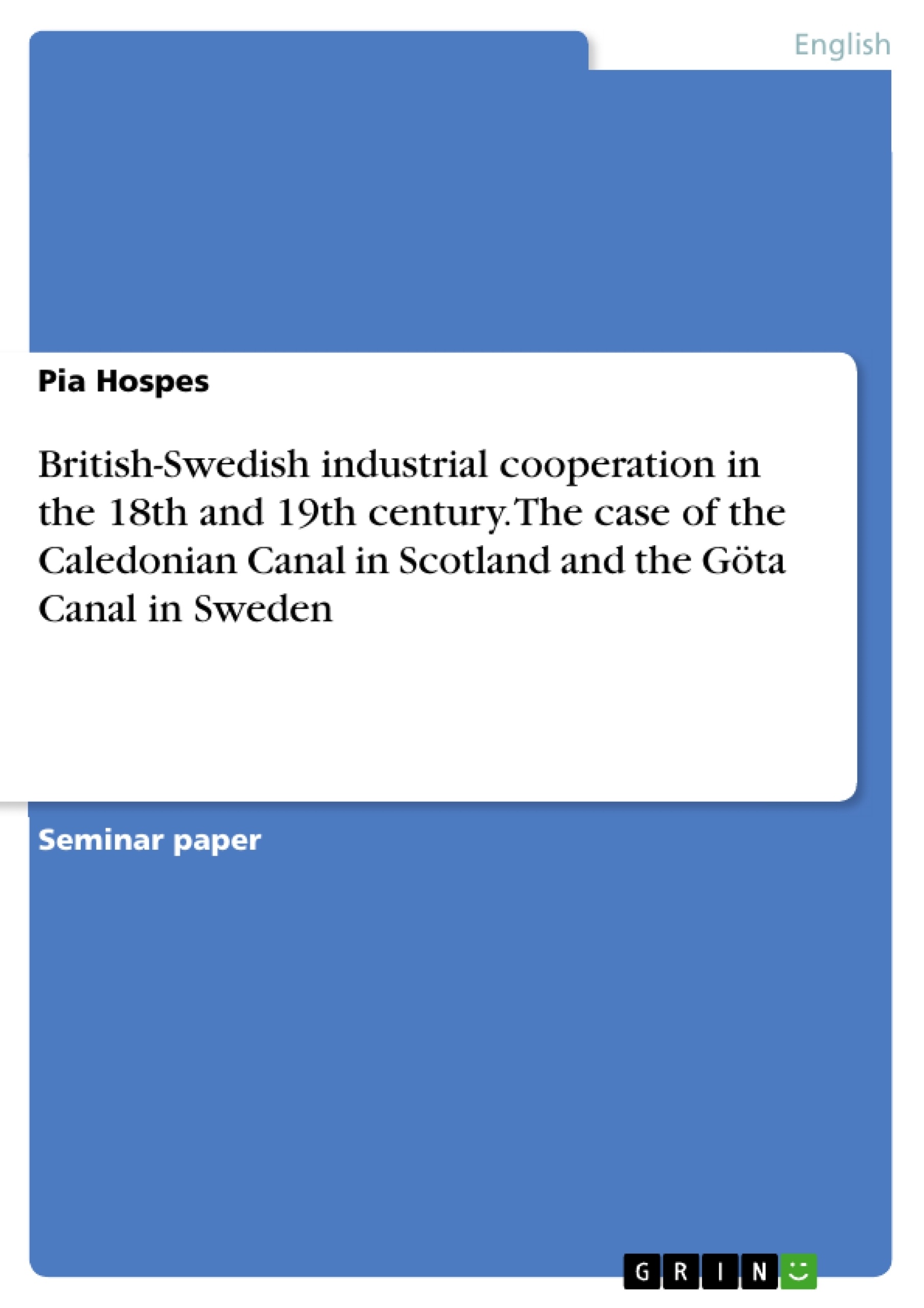Throughout the course of history Sweden and Great Britain often had periods of strong contact and exchange. A few examples are the Viking era or the Hanseatic League. After few contact in the Tudor Age, both countries cooperated heavily during the Industrialization period, beginning in England around 1750. This paper will examine the development of Great Britain and Sweden and their industrial cooperation in the 18th and 19th century. During these years both countries underwent major changes in economy, generally known as the industrial revolution. First it will be examined how the process of industrialization was triggered and which effects it had on society, living standards and the general import and export trades. At the same time, the economic exchange between the two countries will be illustrated. Since the means of transportation play a big role in industrial development, the third chapter will deal with two major construction works that were realized in both countries at roughly the same time. The Caledonian Canal in Scotland and the Göta Canal in Sweden were both planned to enhance the transportation network to enable faster transit of goods across the country (cf. Scottish Canals) (cf. Bjuggren/af Donner 19). Thomas Telford, a British engineer, was responsible for the construction of the Caledonian Canal (cf. Scottish Canals). Due to that fact, Count Baltzar von Platen, who was the leading constructor of the younger Göta Canal (cf. Göta Canal 2010), also involved him in the planning of his project (cf. Smiles 1867, 237).
Inhaltsverzeichnis (Table of Contents)
- Introduction
- Industrialization
- The industrial revolution in Great Britain
- The Industrial Revolution in Sweden
- The Caledonian Canal and the Göta Canal
- General facts
- Objectives of canal construction
- Actors
- Outcome
- Conclusion
Zielsetzung und Themenschwerpunkte (Objectives and Key Themes)
This paper examines the development of Great Britain and Sweden, particularly their industrial cooperation in the 18th and 19th century. The paper investigates how the industrial revolution was triggered and its effects on society, living standards, and the general import and export trades, also highlighting economic exchange between the two countries. It then explores the construction of the Caledonian Canal in Scotland and the Göta Canal in Sweden, examining their role in enhancing transportation networks and enabling faster transit of goods.
- Industrialization and its impact on society
- Economic cooperation between Great Britain and Sweden
- The role of transportation networks in industrial development
- The construction and significance of the Caledonian and Göta Canals
- The influence of British engineering on Swedish infrastructure
Zusammenfassung der Kapitel (Chapter Summaries)
- Introduction: This chapter introduces the topic of British-Swedish industrial cooperation in the 18th and 19th century, highlighting historical connections between the two countries and outlining the paper's focus on the industrial revolution and its impact on both nations. The chapter also briefly discusses the role of transportation networks, specifically the Caledonian and Göta Canals, in facilitating economic growth.
- Industrialization: This chapter examines the concept of the industrial revolution, clarifying its definition and significance. It then delves into the specific events of the industrial revolution in Great Britain, exploring the economic and social changes that occurred during this period. The chapter concludes by examining the impact of industrialization on trade between Britain and Sweden.
- The Caledonian Canal and the Göta Canal: This chapter focuses on the construction and significance of the Caledonian Canal in Scotland and the Göta Canal in Sweden. It provides general facts about each canal, outlines their objectives, highlights key actors involved in their construction, and discusses their overall impact on the transportation networks of both countries.
Schlüsselwörter (Keywords)
The primary keywords and focus topics of this paper are industrial revolution, British-Swedish cooperation, transportation networks, canals, Caledonian Canal, Göta Canal, economic development, and social impact.
Frequently Asked Questions
What is the historical significance of the Caledonian and Göta Canals?
Both canals were major 19th-century engineering projects designed to enhance transportation networks and facilitate faster transit of goods during the Industrial Revolution.
Who was Thomas Telford?
Thomas Telford was a prominent British engineer responsible for the Caledonian Canal in Scotland and a key advisor for the planning of the Göta Canal in Sweden.
How did industrialization impact trade between Britain and Sweden?
Industrialization triggered a heavy economic exchange, with both countries undergoing major changes in living standards and import/export trades starting around 1750.
What were the main objectives of canal construction in this period?
The primary goals were to bypass difficult sea routes, reduce transit times for commercial goods, and stimulate regional economic development.
Who was Baltzar von Platen?
Count Baltzar von Platen was the leading constructor and driving force behind the Göta Canal project in Sweden, collaborating with British experts.
- Quote paper
- Pia Hospes (Author), 2014, British-Swedish industrial cooperation in the 18th and 19th century. The case of the Caledonian Canal in Scotland and the Göta Canal in Sweden, Munich, GRIN Verlag, https://www.hausarbeiten.de/document/293453


